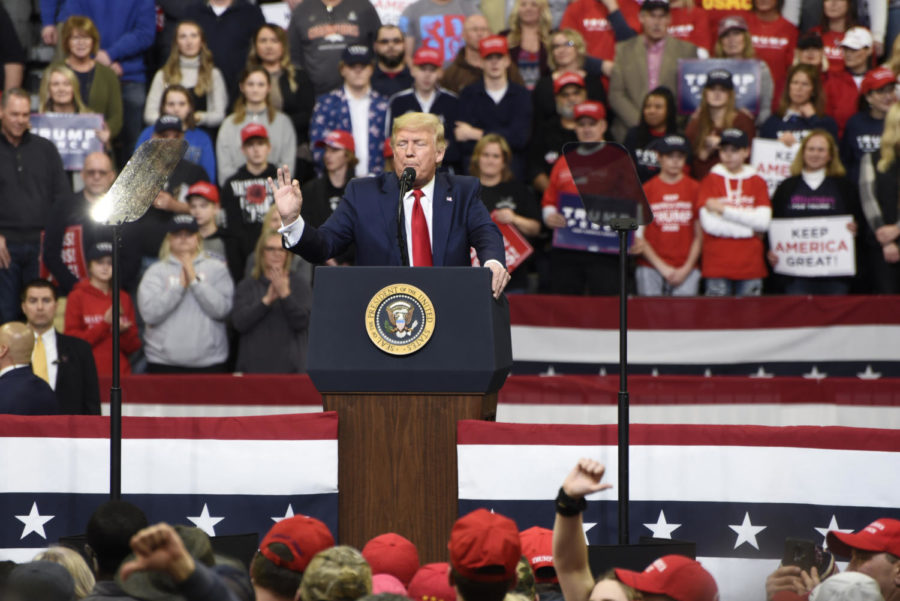Trump intervention in Roger Stone sentencing is rule of law problem, Iowa State instructor says
February 13, 2020
Following the intervention of Attorney General William Barr, four federal prosecutors withdrew from the Roger Stone case Tuesday.
Stone was originally facing a recommended sentence of seven to nine years, but Department of Justice officials recommend a more lenient sentence.
A known ally of President Donald Trump, Stone was convicted on seven counts, including witness tampering and lying to investigators.
Trump posted tweets early Tuesday defending Stone and claiming the sentence is “unfair.”
“This is a horrible and very unfair situation,” Trump said in a tweet. “The real crimes were on the other side, as nothing happens to them. Cannot allow this miscarriage of justice!”
Trump later denied any involvement in attempting to influence the case.
“No I did not speak to the Justice Department, I would be able to do it if I wanted to, I have the absolute right to do it,” Trump said in a press conference broadcast by Global News. “I stay out of things to a degree that people wouldn’t believe, but I didn’t speak to him. I thought the recommendation was ridiculous, I thought the whole prosecution was ridiculous and I look at others that haven’t been prosecuted, or I don’t know where it is now, but when you see that I thought it was an insult to our country and it shouldn’t have happened. We will see what goes on there, but that was a horrible arbitration.”
Trump then went on to say “these are the same Mueller people,” and they put “everyone through hell” and called the process a “disgrace.”
Mack Shelley, Iowa State professor and chair of the political science department, said prosecutors typically follow federal guidelines when deciding sentences that have maximums and minimums and it is up to individual prosecutors and judges to decide a sentence.
Dirk Deam, associate teaching professor of political science, said sentencing guidelines are designed to provide equity in the sentences that come from the Justice Department.
“What they do is if you did something that is in violation of the law there is a standard range of sentences that are associated with that crime […] essentially the guidelines are to create some kind of justice and equity in the disposition of sentence,” Deam said.
Deam said the seven to nine years Stone originally received is a normal sentence the Department of Justice could ask for and may have been a little on the light side.
“This is why the U.S. attorneys were so upset, because they thought they had already accounted for whatever leniency that they needed to do, that is why they did not appreciate the Justice Department intervening,” Deam said.
Shelley said it seems as though the case has been impaired by the Justice Department, and that is why the attorneys left the case.
“I think obviously the main motivation was they felt like the case had been developed was being undermined by direct intervention of the Department of Justice, the attorney general, the bigger worry is that he was operating under implicated direction from the president and probably others in the White House,” Shelley said. “They are certainly reacting from a personal level, all the time and effort going down the drain. The people that do this thing professionally tend to take their work very seriously and they are proud of what they do and probably do it really meticulously.”
Deam said nobody knows what is driving the Department of Justice to intervene, but the conclusion is there is a problem with the notion of the rule of law.
“As a lawyer and somebody that teaches law, the problem here is the notion of the rule of law,” Deam said. “The rule of law is a faith that our law is fair, and something we can respect, and everything about the institutions that enforce law is supposed to be rooted in the rule of law. Meaning, that it is not going to be corrupted by outside influences. For that reason, people who serve in office that are associated with, let’s say the Justice Department or judges, have really high ethical standards that they are supposed to avoid the appearance of favoritism.”
Deam said without these standards it leaves people to jump to the conclusion of favoritism and bending the system to benefit oneself.
“When that impression begins to take hold then people lose confidence altogether in the institutions of law and law itself,” Deam said. “So it doesn’t matter, the damage has already been done. The fact that people are asking that question [of favoritism] means there has already been suspicion.”
Deam said the president’s actions would fall under abuse of power.
“The president under the oath of office is supposed to make sure that laws are faithfully executed,” Deam said. “The idea that the president is ultimately the one who is, himself and his officers, charged to make sure that laws that are passed and laws that abound all of us are treated with respect and are faithfully executed, and if you apply pressure to make sure that you get what you want for yourself without any regard for your country or the rule of law then by definition you have broken your oath of office, that is abuse of power.”
Deam said it is an impeachable offense, but it seems unlikely to be carried through the process because it would likely have a similar outcome as the previous impeachment. Trump had previously been impeached on charges of abuse of power and obstruction of Congress.
Shelley said it seems as if Trump can do no wrong among certain Republicans.
“I don’t think it is going too far to say the Republicans in the Senate just gave Trump the green light to pretty much go ahead and do whatever he wants,” Shelley said. “The message they sent is we don’t care what you do, just so it doesn’t damage us so much.”
Deam said this is not an issue of the system, but is an issue of the people that are being elected and the only way to change that is to vote.
“I think what is wrong are the people in the system, the U.S. senators are supposed to act as protectors of the Constitution and the constitutional system and when they refuse to do that, even in the face of evidence, then they are not doing their job,” Deam said. “There is a resolution to that, you vote them out of office, that is what the founders set up. There is a certain assumption that if you are elected to public office you are supposed to do the things the public office requires you to do and if you fail to do that then voters will ultimately decide that you go away.”







